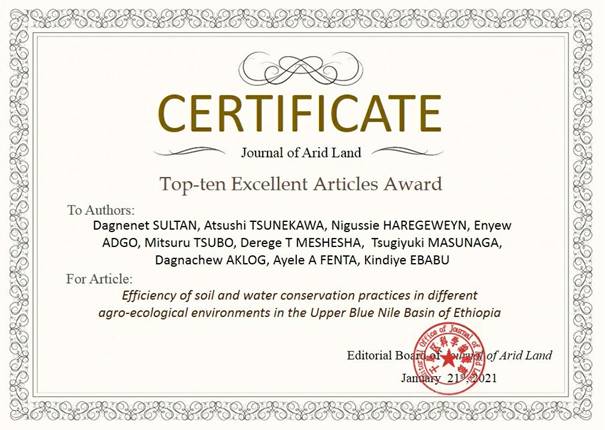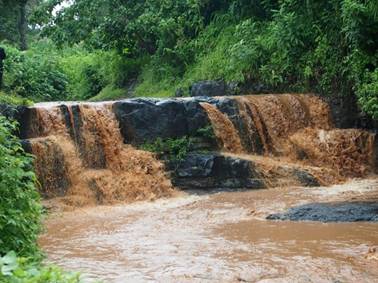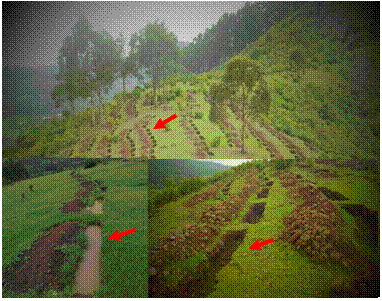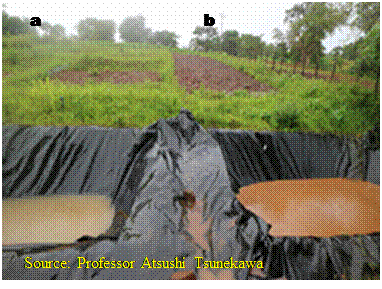
Soil erosion by water is one of the main global environmental threats. Especially countries in the Global South and particularly those in Africa appear to be under severe threat. More specifically, the Upper Blue Nile River basin of Ethiopia is most severely affected by soil erosion that also affects downstream countries such as Sudan and Egypt. The precious topsoil that used to support different forms of life is washed out of the landscape by soil erosion, and the fertility of the land to support agricultural activity continuously declined. To tackle such challenges, various soil and water conservation (SWC) practices have been implanted in the basin which includes the installing of short trenches (i.e., excavating trenches along the contour at the hillside, soil bunds (i.e., raised soil embankment from the ditch is moved downhill that block the flow of water), Fanya juu (i.e., raised soil embankment from the ditch is moved upslope), and soil bunds combined with vegetation establishment to control the runoff and protect soils from detachment.
Research studies on the effectiveness of conservation measures in runoff and soil loss reduction are rare, and if exist, they were focusing a specific conservation practice implemented in a single agro-ecology. We realize that one size does not fit all with the notion that SWC conservation practices that are technically effective or suitable for one specific site location are not necessarily the best option for other site locations.
Consequently, we established a total of 42 experimental runoff plots (30 m long × 6 m wide each) in different land cover and different slope gradients in three agro-ecology systems in the Upper Blue Nile Basin. These sites have different annual precipitation, elevation, experiences with soil and water conservation, soil erosion rates, and land use types. Each plot had a unique soil and water conservation measures (short trenches, soil bund, Fanya juu, soil bund with vegetation establishment, and a control without treatment). We investigated the plot data for seasonal runoff, runoff coefficient, runoff conservation efficiency, and seasonal soil moisture availability, and we have published an article “Efficiency of soil and water conservation practices in different agro-ecological environments in the Upper Blue Nile Basin of Ethiopia” in an academic journal “Journal of Arid Land, Springer” with recommending policy makers and managers to choose the most effective conservation measures based on field trials and to promote the adoption of suitable SWC that can be tested at other locations with similar soil, climatic, and topographic conditions.
On January 21, 2021, the authors of this work had received a recognition and awarded a certificate since the article has been selected as “Top-ten Excellent Articles Award” of Journal of Arid Land. The “Top-ten Excellent Articles” (2018-2019) were selected based on downloaded frequency, cited frequency, and results of editorial board members’ ballots. This successful achievement encouraged the authors for further relentless hard work to contribute for science and development and the authors are still adamant yet to show facts with scientific evidence to protect our Mother Earth and environment and make the possibility of a conducive and happy life to human being.
This work was performed by Dr. Dagnenet Sultan (Visiting Associate Professor), Prof. Atsushi Tsunekawa, Prof. Mitsuru Tsubo, Dr. Ayele A Fenta (Specially Appointed Assistant Professor) and Kindiye Ebabu (Specially Appointed Assistant Professor), who belong to Arid Land Research Center, and Prof. Nigussie Haregeweyn (Specially Appointed Professor), International Platform for Dryland Research and Education, Tottori University.
 |
Precious topsoil that can be used to support different forms of life is
washed away in the lowland agro-ecology of Upper Blue Nile Basin of Ethiopia.
|
 |
Partial view of short trenches conservation measures implemented in the
highland agro-ecology of Upper Blue Nile basin, Ethiopia. Red arrows indicate
the slope direction.
|
 |
Effect of soil bunds in runoff and sediment concertation: (a) treated plot
with soil bunds integrated with grass (less runoff and sediment concentration);
(b) untreated control plot (high runoff and sediment concentration).
|
|
Dr. Dagnenet Sultan’s comments on receiving the award
|
|
 |
I am extremely honored to be a recipient of the 2018-2019 “Top-ten Excellent
Articles Award” of the Journal of Arid Land for our research article titled,
“Efficiency of soil and water conservation practices in different agro-ecological
environments in the Upper Blue Nile Basin of Ethiopia”. This is indeed
a magnificent recognition that could inspire me as well as other early
career researchers to work harder and contribute for advancement of science
and development, particularly on the problems of developing countries like
Ethiopia. This achievement was possible thanks to an exemplary and outstanding
scientific collaboration between my home institute-Bahir Dar University,
Ethiopia and Tottori University, Japan. So, I am sharing this prize with
overwhelming pride with the scientists and field data collectors involved
in this research as well as the funder for this research (Japan Society
for the Promotion of Science, KAKENHI: Grants-In-Aid for Scientific Research),
which are the core elements of the Sustainable Land Management Project.
However, particular thanks go to Prof. Tsunekawa, Prof. Tsubo and Prof.
Haregeweyn of TU, who have been my mentors throughout my PhD study at Tottori
University. Not surprisingly, this collaboration has been continuing even
after I reunited my home University in 2018. Currently I have re-joined
Tottori University for a one-year research visit which I believe will further
strengthen the ongoing collaboration between the two sides. Last but not
least, we would like to express our profound acknowledgement to the Editorial
Board members of the Journal of Arid Land for recognizing our contribution
and award us the Top-ten Excellent Articles.
 |
| Efficiency of soil and water conservation practices in different agro-ecological environments in the Upper Blue Nile Basin of Ethiopia. |
|
| Journal of Arid Land, 10(2) |
[Abstract]
In developing countries such as Ethiopia, research to develop and promote
soil and water conservation practices rarely addressed regional diversity.
Using a water-balance approach in this study, we used runoff plots from
three sites, each representing a different agro-ecological environment,
e.g., high, mid and low in both elevation and rainfall, in the Upper Blue
Nile Basin of Ethiopia to examine the runoff response and runoff conservation
efficiency of a range of different soil and water conservation practice
and their impacts on soil moisture. The plots at each site represented
common land use types (cultivated vs. non-agricultural land use types)
and slopes (gentle and steep). Seasonal runoff from control plots in the
highlands ranged 214–560 versus 253–475 mm at midlands and 119–200 mm at
lowlands. The three soil and water conservation practices applied in cultivated
land increased runoff conservation efficiency by 32% to 51%, depending
on the site. At the moist subtropical site in a highland region, soil and
water conservation increased soil moisture enough to potentially cause
waterlogging, which was absent at the low rainfall sites. Soil bunds combined
with Vetiveria zizanioides grass in cultivated land and short trenches
in grassland conserved the most runoff (51% and 55%, respectively). Runoff
responses showed high spatial variation within and between land use types,
causing high variation in soil and water conservation efficiency. Our results
highlight the need to understand the role of the agro-ecological environment
in the success of soil and water conservation measures to control runoff
and hydrological dynamics. This understanding will support policy development
to promote the adoption of suitable techniques that can be tested at other
locations with similar soil, climatic, and topographic conditions.
| Sultan, D., Tsunekawa, A., Hargeweyn, N., Adgo, E., Tsubo, M., Meshesha, D.T., Masunaga, T., Aklog, D., Fenta, A.A., Ebabu, K. 2018. Efficiency of soil and water conservation practices in different agro-ecological environments in the Upper Blue Nile Basin of Ethiopia. Journal of Arid Land, 10(2), 249-263. DOI: 10.1007/s40333-018-0097-8 |
|

